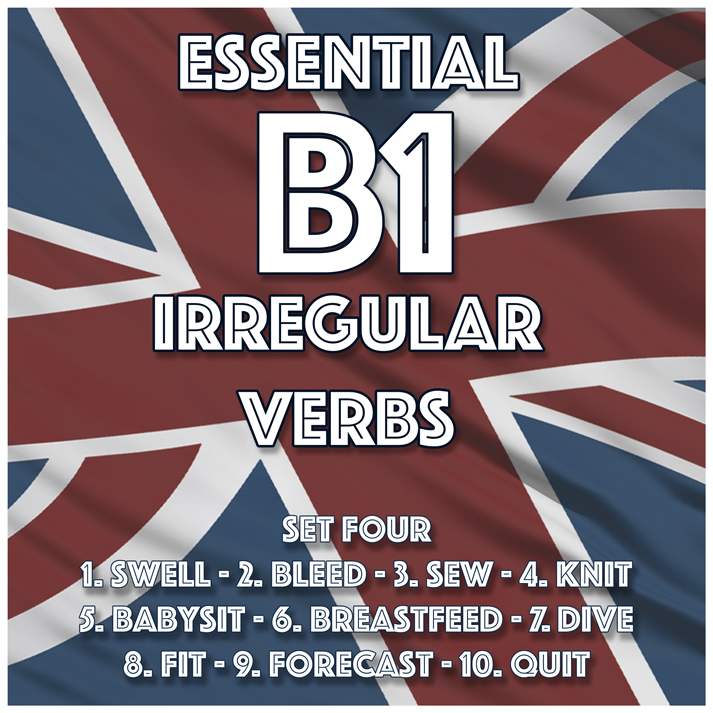This is a list of the most important irregular verbs in the English language which have been divided into CEFR levels and the irregular verbs in this B1 section have been put into 4 sets according to the frequency of the verb.
Below you will find three tests to test your knowledge.
The first column is the infinitive of the verb, the second column is the Simple Past Tense and the third column is the Past Participle.
| Infinitive | Simple Past | Past Participle | Meaning |
|---|---|---|---|
| To swell | swelled | swollen | https://en.wiktionary.org/wiki/swell |
| To bleed | bled | bled | https://en.wiktionary.org/wiki/bleed |
| To sew | sewed | sown | https://en.wiktionary.org/wiki/sew |
| To knit | knit/knitted | knit/knitted | https://en.wiktionary.org/wiki/knit |
| To babysit | babysat | babysat | https://en.wiktionary.org/wiki/babysit |
| To breastfeed | breastfed | breastfed | https://en.wiktionary.org/wiki/breastfeed |
| To dive | dove/dived | dove/dived | https://en.wiktionary.org/wiki/dive |
| To fit | fit/fitted | fit/fitted | https://en.wiktionary.org/wiki/fit |
| To forecast | forecast | forecast | https://en.wiktionary.org/wiki/forecast |
| To quit | quit | quit | https://en.wiktionary.org/wiki/quit |
Essential B1 Irregular Verbs - Set Four
Test your irregular verbs
Essential B1 Irregular Verbs Set Four - Past Participle
Write the past participle forms of the irregular verb shown.
1.
swell - 2.
bleed - 3.
sew - or 4.
knit - or 5.
babysit - 6.
breastfeed - 7.
dive - or 8.
fit - or 9.
forecast - 10.
quit - Essential B1 Irregular Verbs Set Four - Simple Past
Write the simple past forms of the irregular verb shown.
1.
swell - 2.
bleed - 3.
sew - 4.
knit - or 5.
babysit - 6.
breastfeed - 7.
dive - or 8.
fit - or 9.
forecast - 10.
quit - Essential B1 Irregular Verbs Set Four - Infinitive
Write the infinitive forms of the irregular verb shown.
1.
swollen - 2.
bled - 3.
sown - 4.
knitted - 5.
babysat - 6.
breastfed - 7.
dove - 8.
fit - 9.
forecast - 10.
quit - Lists are derived from an internet corpus assembled by the English Grammar Club with use of the university of Lancaster’s LancsBox 5.1.2 software.


Comments